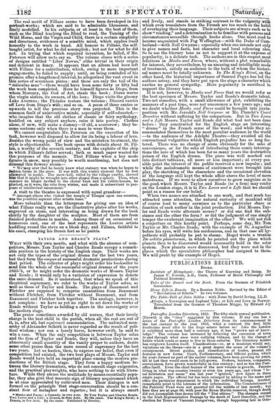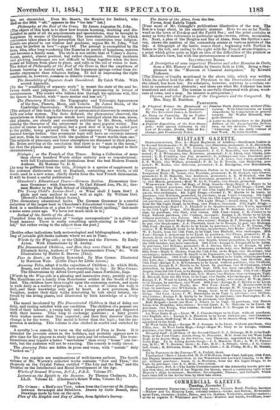PUBLICATIONS RECEIVED.
BOOKS.
Institute of Metaphysic: the Theory of Knowing and Being. By James F. Ferrier, A.B., Oxon, Professor of Moral Philosophy and Political Economy.
Tales of the Desert and the Bush. From the German of Friedrich Gerstacker.
Horne Life in Russia. By a Russian Noble. Revised by the Editor of "Revelations of Siberia." In two volumes.
The Table-Talk of John Selden : with Notes by David Irving, LL.D. ..effraja, a Norwegian and Lapland Tale ; or Life and Love in Norway.
Translated from the German of Theodore Mfigge, by Edward Joy Morris.
Post-office London Directory, 1855. The fifty-sixth annual publication. [Growth is the "idea" suggested by this volume. If any one has a series of the Post-office London Directory from its commencement in the last century to the year 1855, what a. contrast the first little duodecimo must offer to the huge octavo before us! Like the London it exhibited more than half a century ago, it has "grown out of know- ledge." The volume has increased by following the extension of town to and through what once were outlying villages, and by the change of habits which sends so many to live in those suburbs. The Directory besides has outgrown London itself. Classifications—or, as a musician would say, variations on the theme—are in a great degree the cause of the volume's enlargement. Street guides, and classification of trades, present old features in new forms. Court, Parliamentary, and Official guides, which for years formed no part of the earlier volumes, have been growing for years, till at last they would seem to be full-grown. Brokers, bankers, companies, conveyances, have grown wonderfully in this century ; and so has the Post- office itself. Even the chief feature of the new volume is growth. Persons living in what was country twenty or even ten years ago, and whose "lo- cal habitation and name" was last year "ignored," now figure in these ample pages. The official list has been enlarged by adding to the name and office the particular department to which the individual belongs. Another remarkable point is the lateness of the information. The Commissioners of the Patriotic Fund were not gasetted till the middle of last month.; but here they are at page 66, with poor Sir Byam Martin removed, though death did not accomplish that decree till the "21st ultimo." The changes caused in the Irish Representative Peerage by the death of Lord Dunalley, and the election for Truro of Viscount Dungarvan, though happening late in Octo-
her, are chronicled. Even Mr. Stuart, the Member for Bedford, who died on the 26th " ult." appears in the "too late" list.]
Philosophy at the Foot of the Cross. By James Augustus St. John. [The object of this book is to show how human learning, doubting and dis- satisfied in spite of all its acquirements and speculations, may be brought to happiness by means of Christianity. The immediate influence by which conversion takes place is the perception that love constitutes true religion. Limits are placed to our wisdom and goodness, argues Mr. St. John' "but we may be perfect in love "-page 148. The precept is exemplified by the hero, who, after long wandering like Rasselas in search of happruess, marries and becomes a family man. The style is not unlike that of Volney's Ruins; fluent, genial, almost poetical, but rather rhapsodicaL Striking incidents and glowing landscapes are not difficult to bring together when the hero passes ad libitum from place to place, and calls in the aid of vision to boot. The defect of Philosophy at the Foot of the Cross is, that the emptiness of human learning is merely told, and the happiness springs rather from do- mestic enjoyment than religious feeling. To fail in impressing the right conclusion, is, however, common in didactic romance.] The Sensibility of Separate Souls Considered. By Caleb Webb. With second Appendix. [By the "sensibility of separate souls" is meant the state of the soul be- tween death and judgment ; Mr. Caleb Webb pronouncing in favour of consciousness. The reader who follows him through his opinions will, like the Queen in Hamlet, wish "mare matter and leas art."] The Planetary Worlds : the Topography and Telescopic Appearances of the Sun, Planets, Moon, and Comets. By James Breen, of the Cambridge Observatory. With numerous Illustrations.
[The subject of this book is the history of astronomical discovery in connexion with our solar system. The facts deduced, the phenomena observed, the speculations in which ingenious minds have indulged about the sun, moon, and planets, are clearly and succinctly exhibited by Mr. Breen, without sinking the character of the astronomer in the mere popular writer. The matter of course is rarely original, but a good deal of it may be called new to the public, being gleaned from the contemporary " Transactions " of learned foreign bodies. One prominent topic will have an extrinsic interest just now, from its connexion with the question of "more worlds than one." The subjects of planetary and lunar atmosphere are discussed in their places ; Mr. Breen arriving at the conclusion that there is no "man in the moon," but that the planets may possibly be inhabited by beings adapted to their circumstances.]
Ne'ologie ; or the French of Our Times. Being a Collection of more - than eleven hundred Words either entirely new or remodernized : with full Explanations and Quotations from the best Modern French Authors. By Madame Ye. D. G. [As may be gathered from the title,Neologie is a species of supplement to the common dictionaries used in England, containing new words, or old words used in a new sense, chiefly drawn from the best French dictionaries. It will be found a useful publication.] Chambers's Educational Course-German Section. Elementary Ger- man Grammar : with Exercises. ' By Carl Eduard Aue, Ph. D., Ger- man Master in the High School of Edinburgh. The Young Child's lesson-Book ; or. What shall I learn first? A plain and easy method to read well at sight. By William Cart. (Howell's Standard School Series.)
[Two elementary educational hooka. The German Grammar is a careful reduction of the larger book in Chambers's Educational Course. The Lesson- Book is a modification of a plan for "reading without spelling," that made a noise some years ago. We have not much faith in it.] Ballad of the Battle of the Alma. [Versified from the narratives of "foreign correspondents" in a plain and broad manner. There is really something spirit-stirring in the "bal- lad," but rather owing to the subject than the poet.] [Besides other indications both meteorological and bibliographical, a sprink- ling of juvenile gift-books indicate where we are in Time.
Words by the Way-side; or the Children and the Flowers. By Emily Ayton. With Illustrations by H. Anelay.
27w Discontented Children, and How they were Cured. By Mary and Elizabeth Kirby, Authors of "The Leicestershire Flora," &c. With Illustrations by Hablot K. Browne (Phiz).
Puss in Boots ; or Charity Rewarded. By Miss Corner. Illustrated by Harrison Weir. (Little Plays for Little Actors.) Amusing Tales, adapt d to the capacities of Children ; in which Birds,
Beasts, and other Animals, have something to Say. By Miss Corner.
The Illustrations by Alfred Crowquill and James Northcote, Esqa. [Words by the Way-side is a pleasing and instructive story, prettily got up. The Hamiltons are a family from Manchester settled in the South of Eng- land. The children have been taught upon the cramming system, and made to walk daily as a matter of principle. As a matter of course the walk is dull, and their knowledge only got by heart. A new governess, Miss Vaughan, makes their daily walks interesting by talk about botany, en- forced by the living plants, and illustrated by book knowledge of a lively kind.
The moral inculcated by The Discontented Children is that of doing our duty, and resting satisfied with our condition. The children of a peasant are tired of their labours ; a young lady and a young gentleman get disgusted with their lessons. They long to exchange positions ; a fairy grants their wishes sooner than they expected ; and then they discover that the change is for the worse. The moral is better than the logic ; but the im- pression is striking. This volume is also clothed in scarlet and enriched by cuts.
A novelty 1-a comedy in verse on the subject of Puss in Boots. It is intended for juvenile actors in the holidays, and probably appears now to give time for the players to study their parts and for rehearsals. The trans- formations may require a better "mechanist" than every "house" can fur- nish, but the audience will not be exacting. The comedy is really clever.
The Amusing Tales are fables in prose and verse, with "morals" duly "tacked on."]
The two reprints are continuations of well-known authors. The fourth volume of Mr. Warren's collected works contains "Now and Then," the rhapsody on the Crystal Palace entitled "The Lily and the Bee," and the Treatise on the Intellectual and Moral Development of the Age.
Works of Samuel Warren, D.C.L., F.R.S. Volume IV.
Lectures on the .Epistle to the _Romans. By Thomas Chalmers, D.D., LLD. Volume IL (Chalmers's Select Works, Volume IL)
PRINTS.
The Crimea : a Bird's-eye View, taken from the Convent of St. Giorgio, between Sevastopol and Balaklava. Drawn by Carlo Bossoli, from Drawings made by him on the spot. Plan of the Heights and Bay of Alma, from- Spitfire's Survey. The Battle of the Alma, from the Sea. Varna, from Kafirlu Tepeh. [Four more of Mr. Colnaghi's publications illustrative of the war. 111314-. first is a large sheet, in the anastatic manner. Here we see as far Nort4- ward as the town of Pereirop and the Putrid Sea ; and the print contains a many as forty-five references to particular spots-towns, rivers, mountains, &e. Next, a plan of the Heights and Bay of Alma, from the Spitfire's sup. vey, shows the position of the contending armies at various periods of the day. A lithograph of the battle comes third ; beginning with Burliuk in. flames to the left, and ending to the right with the French steam-frigates, a print which gives quite as high an idea of the difficulties of the position. as Mr. Maclure's view, but with less picturesqueness of manner.] ILLUSTRATED Bonus.
A Description of some important Theatres and other _Remains in Crete, from a MS. History of Candia by Onorio Belli in 1586. Being a Sup- plement to the "Museum of Classical Antiquities." By Edward Falkener.
[The History of Candle mentioned in the above title, which was written while its author held the office of Physician to the Provveditor-General of the island, has been lost. Its substance, however, survives to a certain ex- tent in summaries and abstracts ; and these are what Mr. Falkener has here translated and edited. The treatise is carefully illustrated with plans, wood- cuts of coins, and a map. Its interest is antiquarian.] ChicOra, and other Regions of the Conquerors and the Conquered. By Mrs. Mary H. Eastman.
Is Physical Science the Handmaid or the .Enenly of Christian Revelation ! By the Re% erend James A. Stothert. An Essay on Causality. By an Under- Graduate of the University of Cam- bridge. A Popular .Erposition of the New Stamp Acts ; with special reference to the Law of Receipts, Drafts, Bills of Ex- change, and Protniasory Notes.
Pastrimurs.
Painless Tooth Extraction eithotd Chlo- roform. With Observations on Local Anesthesia by Congelation in general surgery. By Walter Blundell, Sur- geon-Dentist A Letter to the Subscribers to the Eighth Edition of the Encyclopedia Briton- nice, on the Articles "Calvin " mid •• Charming," in the sixth volume of that Work. By John Gordon.



























 Previous page
Previous page